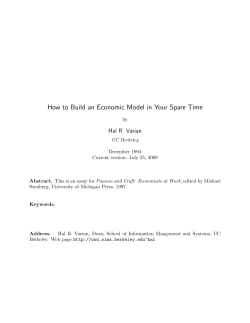
How to Evaluate and Monitor Communication 1 hure
Interactive European Seminar 4th and 5th November 2010, Berlin Brochure How to Evaluate and Monitor Communication of EU Funds – Advanced Workshop 1 European SEMINAR “How to Evaluate and Monitor Communication of EU Funds – Advanced Workshop” Background EU funds communications have to be evaluated on a regular basis and to be revised if needed. For this, the responsible body should be able to define and use evaluation and monitoring measures. Difficulties arise as the process of evaluating communication is only slowly becoming more concrete as a tool itself. This lack is in startling contrast with the extent to which communication actions and evaluation requirements have increased. Acquiring detailed knowledge of advanced methods will enable participants to handle challenges in their future evaluation of communication. In most Member States and their subsequent programmes communication plans for EU funds are already in full activity. The question of how to monitor and evaluate the effectiveness of EU Funds communication activities is becoming ever more important. Interactive European Seminar What are successful tools for monitoring and evaluating communications of EU funds? Target Group • Decision makers for communication of EU funds in national, regional, local administrative authorities. • Communication Officers, Communication Experts and Information Officers • Decision makers for allocating EU funds in regional development agencies, business associations, investment centres Your Benefit • Ensure a high quality of your evaluation reports • Enrich your experience in EU funds communication with innovative ideas • Discover new ways and approaches for your daily tasks and become familiar with advanced methods • Learn more about the requirements of the European Commission for communications, monitoring and evaluation Exchange | Discuss | Contribute • Avoid risk of choosing wrong indicators and taking wrong measures • Be aware of common pitfalls in evaluation process Your participation is essential! You only benefit from this interactive seminar, if you contribute your own communication working material like: • Get to know first-hand evaluation model and learn step-by-step how to monitor and evaluate your communication actions • • • • • Benefit from a multiplicity and variety of good practice examples and learn to make best use of lessons learnt Operational programmes branding examples EU funds project flyers, brochures, posters Powerpoint, videos and other interactive media Website demonstrations and any other useful material demonstrating your communication activities • Learn how social media can be a powerful tool in communicating EU funded projects • Come to know about the future budget negotiations for the upcoming programme period 2014-2020 • Gain practical advice and answers to your individual questions • Exchange your knowledge with experts and colleagues from several Member States in interactive workshops Profit from good practice reports and understand how communication is addressed in other Member States Teaching Methods • Lectures and case studies • Discussions and Q&A Sessions • Rich course material “An excellent opportunity to exchange knowledge” Giedré Maksimaityté, Head of Public Relation Division, Ministry of Health, Republic of Lithuania “This seminar was very intensive and full of important information for me.” Joanna Gajda, Head of Division, Ministry of Economy, Poland 2 PROGRAMME DAY 1 “How to Evaluate and Monitor Communication of EU Funds – Advanced Workshop” 4th November 2010 8.30-9.00 Registration and Hand-out of Seminar Material 9.00-9.05 Opening Remarks from the European Academy for Taxes, Economics & Law B Pr est ac tic e 9.05-9.15 14.00-15.00 Welcome Note by the Chair Henrik Josephson, Senior Communications and Publicity Officer, North Sea Region Programme, Denmark Evaluation and Monitoring of Communications, Part II •Examples to monitoring •Evaluation of communications – step by step approach •Examples of evaluation Anna Kanakaki, Communication Officer, Programming & Evaluations Unit, Managing Authority, Operational Programme “Health & Welfare”, Greece 9.15-9.30 Introduction •Introduction and overview •Programme presentation Henrik Josephson, Senior Communications and Publicity Officer, North Sea Region Programme, Denmark 15.00-15.15 Q&A Session 09.30-10.15 15.15-15.45 Current Challenges of EU Funds Communications •Programme – project cooperation and integration in communications •Programme facilitation •Budgeting communications, internal competence and outsourcing Henrik Josephson, Senior Communications and Publicity Officer, North Sea Region Programme, Denmark Coffee Break 15.45-16.45 Communications 2000 - 2010: Lessons Learnt •Lessons learnt from other evaluations of communications at national and European level •Useful experiences from former projects •How to avoid common pitfalls in evaluation process Anna Kanakaki, Communication Officer, Programming & Evaluations Unit, Managing Authority, Operational Programme “Health & Welfare”, Greece 10.15-10.30 Q&A Session 10.30-11.00 Coffee Break 11.00-12.30 B Pr est ac tic e Evaluation and Monitoring of Communications, Part I •Evaluation and monitoring – detailed background (definitions, basic model, examples of intervention logic, prerequisites) •Evaluation of communications and relevance for programme development •Communications – step by step to monitoring Anna Kanakaki, Communication Officer, Programming & Evaluations Unit, Managing Authority, Operational Programme “Health & Welfare”, Greece 16.45-17.00 Q&A Session 17.00 End of Day One 12.30-12.45 Q&A Session 12.45-14.00 “Very useful and fruitful seminar, with emphasis to good and bad examples.” Pambina Neokleous, Planning Officer, Planning Bureau, Cyprus Lunch Break “A practical approach to communications theory” Ruta Sile, Senior Project Manager, Latvian Railway, Latvia 3 Programme day 2 “How to Evaluate and Monitor Communication of EU Funds – Advanced Workshop” 5th November 2010 8.30-8.45 14.00-14.45 Opening by the Chair Henrik Josephson, Senior Communications and Publicity Officer, North Sea Region Programme, Denmark Social Media •Background •Relevance and future prospects •How to use in public realm communications •Good practice example Henrik Josephson, Senior Communications and Publicity Officer, North Sea Region Programme, Denmark 8.45-10.00 Good Practice Projects •How to make best use of experiences and lessons learnt - Criteria of best practice - Case studies C St ase ud y •Interactive session with participants Henrik Josephson, Senior Communications and Publicity Officer, North Sea Region Programme, Denmark Anna Kanakaki, Communication Officer, Programming & Evaluations Unit, Managing Authority, Operational Programme “Health & Welfare”, Greece 10.00-10.15 Q&A Session 10.15-10.45 Coffee Break 10.45-12.30 Wo sh rkop Evaluation and Monitoring – Practical Exercise Henrik Josephson, Senior Communications and Publicity Officer, North Sea Region Programme, Denmark Anna Kanakaki, Communication Officer, Programming & Evaluations Unit, Managing Authority, Operational Programme “Health & Welfare”, Greece 14.45-15.00 Q&A Session 15.00-15.15 Coffee Break 15.15-16.15 Budget Negotiations and Its Implications for Programme •2014-2020 budget negotiations and its implications for programme communications Henrik Josephson, Senior Communications and Publicity Officer, North Sea Region Programme, Denmark 16.15-16.30 Conclusions / Discussion Anna Kanakaki, Communication Officer, Programming & Evaluations Unit, Managing Authority, Operational Programme “Health & Welfare”, Greece Henrik Josephson, Senior Communications and Publicity Officer, North Sea Region Programme, Denmark 16.15-16.30 End of Seminar and Hand-out of Certificates 12.30-12.45 Q&A Session 12.45-14.00 Lunch Break “…extremely useful to see other examples of good/bad practice” Clara Smith, Marketing Manager, North West Regional Development Agency, United Kingdom 4 SPEAKERS “How to Evaluate and Monitor Communication of EU Funds – Advanced Workshop” Anna Kanakaki Communication Officer, Programming & Evaluations Unit, Managing Authority, Operational Programme “Health & Welfare”, Greece Anna Kanakaki is a Senior Trainer at the Hellenic Academy for Public Administration and participates actively in EC working groups and networks (the INFORM Network of DG Regio, Evaluation working group of DG Emploi, national trainers groups, etc.). She has been working as Project Manager for ESF, PHARE and DAC projects since 1994. In 2004 she became Senior Programming and Evaluation Expert in the Managing Authority of the Hellenic Ministry of Health & Welfare. Anna Kanakaki holds an MBA from Athens University in Economics and Business and is an IPMA certified Project Manager. Henrik Josephson Senior Communications and Publicity Officer, North Sea Region Programme, Denmark Henrik Josephson is Senior Communications Officer of the North Sea Programme 2007-2013. He has more than 10 years professional experience from media and marketing as Manager, Project Manager and Editor in Chief. Henrik holds a Masters Degree in Communications. “…professional dialogue between the speakers” Inita Blacforda, Communication Unit Leader, The State Education Development Agency, Latvia 5 organisational matters “How to Evaluate and Monitor Communication of EU Funds – Advanced Workshop” bOOKING Fax: +49 (0)30 80 20 80-250 Your contact person FOR THE PROGRAMME: E-mail: booking@euroacad.eu Regina Lüning, M. Sc. econ. Phone: +49 (0)30 80 20 80-230 Head of Marketing and Sales For online booking please visit Phone: +49 (0)30 80 20 80-246 our website: www.euroacad.eu Fax: +49 (0)30 80 20 80-259 E-mail: regina.luening@euroacad.eu BOOKING NUMBER S-229 Joanna Baka M.A. Senior Conference Manager Date of Event Phone: +49 (0)30 802080-235 4th and 5th November 2010 Fax: +49 (0)30 802080-259 E-mail: joanna.baka@euroacad.eu BOOKING MODALITIES It is recommended to book soon as seats are limited. For organisational (Programme is subject to alterations) matters, we kindly ask you to complete the booking form in capital letters. CONTACT European Academy for Taxes, Economics & Law Event Language Hausvogteiplatz 13, 10117 Berlin, Germany The event language will be English. Phone: +49 (0)30 80 20 80-230 Fax: Event Price 949,- Euro, excl. German VAT (19%) +49 (0)30 80 20 80-250 E-Mail: info@euroacad.eu Internet: www.euroacad.eu Normal price from the 25th of September 2010: 989,- Euro, excl. German VAT (19%) Event lOCATION Maritim Hotel Berlin The above price covers the following: Stauffenbergstraße 26 • Entrance for both event days 10785 Berlin, Germany • Hand-out documents Phone: +49 (0)30 2033 4410 • Soft drinks and coffee/tea Fax: • Lunch on both days E-Mail: info.ber@maritim.de +49 (0)30 2033 4092 Internet: www.maritim.de Please contact the hotel directly and refer to the “European Academy for Taxes, Economics & Law” in order to benefit from a limited room contingent at a special price. Please book as soon as possible. Of course you can always look for an alternative hotel accommodation. 6 NOTE Please note, you can register as many delegates as you wish (except, the seminar is fully booked). You only need to copy this formular for as many persons you wish. European Academy for Taxes, Economics & Law Phone.: +49 (0)30 802080-230 Brauner Klingenberg GmbH Fax: Hausvogteiplatz 13 E-mail: info@euroacad.eu 10117 Berlin / Germany www.euroacad.eu booking Booking Number: S-229(KB) +49 (0)30 802080-250 DATE: 4 th - 5 th November 2010 Herewith we register the following persons for the Seminar: “How to Evaluate and Monitor Communication of EU Funds – Advanced Workshop”. Delegate 1 Ms. Mr. First name Last name Department Job position Phone Fax E-mail Your organisation Street Postcode / City Country Delegate 2 Ms. Mr. First name Last name Department Job position Phone Fax E-mail Your organisation Street Postcode / City Country Delegate 3 Ms. First name Mr. Last name Department Job position Phone Fax E-mail Your organisation Street Postcode / City Country Invoice organisation To the attention of Street Phone Postcode / City Fax Country E-mail In case of registration of more than one delegate - do you prefer: single invoice? collective invoice? With my signature I confirm my registration and accept the General Terms and Conditions as legally binding. I herewith agree to receive further information from the European Academy for Taxes, Economics & Law Place, Date Authorised Signature / Stamp 7 Terms & Conditions for Training Seminars & Courses 1. Area of Application The following terms and conditions settle the contractual relationship between conference participants and the European Academy for Taxes, Economics & Law Brauner Klingenberg GmbH [referred to as “European Academy for Taxes, Economics & Law” in the following]. Differing terms and conditions, as well as, other settlements and/or regulations have no validity. 2. Registration / Confirmation of Application A registration can be made via internet, mail, fax, or email. The registration is considered granted and legally binding if not rejected by the European Academy for Taxes, Economics & Law in writing within seven (7) days after receipt of registration. The registration will be supplemented by a booking confirmation via email. Partial bookings are only valid for seminars designed in modules. 3. Service The course fee covers the fee per participant and course in € net, subject to current German VAT. It includes training course documents as per course description, a lunch meal/ snack and refreshments during breaks, as well as, a participation certificate. The European Academy for Taxes, Economics & Law has the right to change speakers/instructors and to modify the course program if and where necessary while maintaining the overall nature of the course. All registered participants will be notified in case of a course cancellation due to force majeure, due to speakers’ preventions, due to troubles at the chosen location or due to a low registration rate. Course cancellation notification due to a low registration rate is issued no later than two (2) weeks before the course date. Course fees are reimbursed in the cases listed above; however, reimbursement for travel expenses or work absenteeism is only granted in cases of intention or gross negligence by the European Academy for Taxes, Economics & Law. Any reimbursement of travel expenses are to be considered as an exceptional goodwill gesture and form no future general obligation. In case of disturbances and/or interruptions, the European Academy for Taxes, Economics & Law commits itself to solve or limit any problems that might occur in order to maintain and continue the course as planned. 4. Payment Date and Payment, Default of Payment Payment of the course fee is payable immediately upon receipt of invoice. Where payment is not received or lacking clear assignment to a participant prior to commencement of the course, the European Academy for Taxes, Economics & Law may refuse the relevant participant’s participation in that course. The course fee, however, is still due immediately and can be claimed as part of a dunning procedure or legal action. In accordance with BGB §247 (1), in case of default of payment within the stipulated time period, default interest on arrears of at least 5% above the ECB base rate is due and payable. The European Academy for Taxes, Economics & Law can claim higher damage for delay if and where proven. Equally, the participant may prove that a damage has not occurred or has had less effect than estimated by the European Academy for Taxes, Economics & Law. Payment shall be made by cashless bank transfer; cash or cheques will not be accepted. The European Academy for Taxes, Economics & Law is not liable for any loss of means of payment. The participant may only offset such claims against the European Academy for Taxes, Economics & Law’s as are undisputed, legally recognized or recognized in writing by the European Academy for Taxes, Economics & Law. The right of retention is only acceptable in accordance with a counterclaim based on the same contract. 5. Cancellation Cancellations need to be issued in writing. Cancellation by the participant will be subject to cancellation charges as follows: • 30 days or more prior to commencement of the course: service charge of 80,00 € net, subject to current German VAT, payable immediately, course fee will be reimbursed, • two (2) weeks to 30 days prior to commencement of the course: 50% of course fee net, subject to current German VAT, payable immediately, • non-attendance or cancellation less than two (2) weeks prior to commencement of the course: 100% of course fee net, subject to current Germany VAT, payable immediately The European Academy for Taxes, Economics & Law gladly accepts without additional costs a substitute participant nominated in case of a cancellation if the substitute participant is registered at least three (3) days prior to the commencement of the course. Neither cancellation of a specific module/part of the course or substitution per module/per day is possible. 6. Copyright Seminar/course documents are protected by property rights and may not be duplicated, processed, amended, circulated or published in any other way without the written consent of the European Academy for Taxes, Economics & Law. The European Academy for Taxes, Economics & Law reserves all rights. 7. Liability All seminars and courses are prepared and presented by qualified speakers and instructors. The European Academy for Taxes, Economics & Law accepts no liability for the upto-dateness, correctness and completeness of the seminar documentation, as well as, presentation of the seminar. 8. Applicable Law, Place of Jurisdiction, Place of Performance All cases shall be governed and construed in accordance with German law to the exclusion of the UN Sales Convention. As far as legally admissible, place of performance and place of exclusive jurisdiction shall be Berlin, Germany. 9. Data Protection The European Academy for Taxes, Economics & Law protects personal data by taking appropriate protection measures. For the purpose of optimization of the product and service portfolio and according to the regulations of the data privacy laws, it stores and processes person-specific data on the training participants. Hence, all European Academy for Taxes, Economics & Law website hits are registered. All personal data will, in accordance with the law, be used for documentation requests, placed orders or other enquiries in order to send information out by post. The European Academy for Taxes, Economics & Law will, in accordance with the law, inform participants by email about special offers that resemble previously booked seminars. If and where personal data needs to be transferred to countries lacking appropriate data protection schemes, the European Academy for Taxes, Economics & Law shall grant alternative adequate protection. Furthermore, the European Academy for Taxes, Economics & Law will use personal data as far as participants have granted respective permission. When collecting personal data, the European Academy for Taxes, Economics & Law will always ask for permission regarding email information about offers. The participant may, at any time, express their objection to data collection for the purpose of advertisement or address via email or fax. Any data provided to the European Academy for Taxes, Economics & Law will be processed for reservations and bookings, as well as, for information about other seminars. Names and company names will be published in a participants’ list and forwarded to the mailing company. 8
© Copyright 2025





















